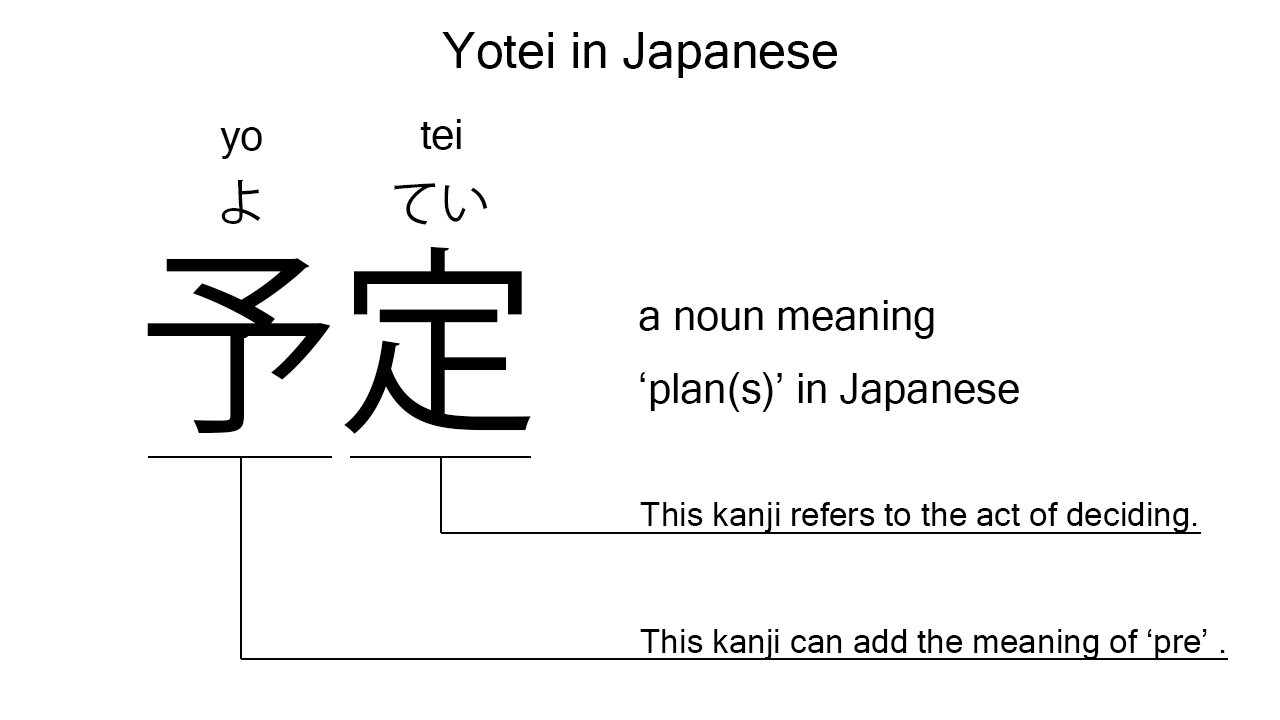What does “yotei” mean in Japanese?
Native speakers say “yotei” often to mean ‘plan’ in Japanese. Perhaps, some Japanese learners know this word as it is sometimes used in Japanese conversations. In this blog post, however, I will explain this word in detail based on its kanji expression. And also, I will explain how to use it through example sentences. My explanations would help Japanese learners understand “yotei” more clearly. Then, let’s get started!
Contents
Definition and meanings of “yotei”
Let me start with the definition and meanings of “yotei”.
- yotei – 予定 (よてい) : a noun meaning ‘plan’ or ‘schedule’ in Japanese. This can also work as plural. Learn more about Japanese plural.
Japanese native speakers use this noun often to refer to something they have decided to do. So, the usage is very similar to that of “plan” in English.
The definition and meanings are simple and clear. To understand this noun more clearly, however, let me explain its kanji characters in detail, one by one.
What does “yotei” literally mean in Japanese?
The kanji expression of “yotei” consists of the following two kanji characters:
- 予 : a kanji character often used to add the meaning of ‘pre-‘.
- 定 : a kanji character often used to refer to the act of deciding or defining.
From these two kanji characters, we can understand that “yotei” literally means ‘pre-decided’ in Japanese. This literal interpretation is very close to the actual meanings. Plans are, anyway, something pre-decided to do.

When we meet new kanji expressions, we should check their kanji characters in detail to understand their meanings clearly and deeply. In many cases, kanji characters tell us a lot about the meanings of the expressions they form. Actually, here, we could get the better understanding of “yotei” through the detailed kanji check above.
So far, I’ve explained the definition and meanings of “yotei” together with its kanji characters. Then, let me explain how to use it through the example sentences below.
Example #1: how to say “plan” in Japanese
ashita yotei ga ari masu ka – 明日予定がありますか (あしたよていがありますか)
Do you have any plan tomorrow?
Below are the new words used in the example sentence.
- ashita – 明日 (あした) : a noun meaning ‘tomorrow’ in Japanese. This can also work as an adverb almost anywhere in a sentence. In the example, this works as an adverb at the beginning of the sentence to say “tomorrow” in Japanese.
- ga – が : a case particle used to make the subject word or the object word in a sentence. In the example, this is used after “yotei” to make the subject in the sentence.
- ari – あり : one conjugation of the verb, “aru”, which is used to say that something exists in Japanese. In the example, this is used to say that “yotei” exists.
- masu – ます : an auxiliary verb used after a verb to make it polite. Probably, this is well known as a part of Japanese masu form. In the example, this is used after “ari” to make it sound polite.
- ka – か : a sentence-ending particle used to make a question. As the definition suggests, this is used at the end of the example sentence to make the question. This is often used with the pitch raised.
This is a typical usage of “yotei”. In the example, it works as the subject in the sentence and means a ‘plan’ in Japanese.
Example #2: another usage of “yotei”
ashita wa tokyo ni iku yotei desu – 明日は東京に行く予定です (あしたはとうきょうにいくよていです)
I’m going to Tokyo tomorrow.
Below are the new words used in the example sentence.
- wa – は : a binding particle working as a case marker or topic marker. In the example, this works as a topic marker after “ashita” to put a focus on it.
- tokyo – 東京 (とうきょう) : a noun meaning ‘Tokyo’ in Japanese.
- ni – に : a case particle used to say where someone or something goes. In the example, this is used after “tokyo” to say where the speaker is going tomorrow.
- iku – 行く (いく) : a verb meaning ‘to go’ in Japanese.
- desu – です : an auxiliary verb used after a noun or adjective to make it polite. Probably, this is well known as a part of Japanese desu form. In the example, this is used after “yotei” to make it sound polite.
This is another typical usage of “yotei”. It is often preceded by a clause which describes a plan in detail. In this example, it is preceded by the clause “tokyo ni iku” to literally mean ‘a plan to go to Tokyo’ in Japanese. The formed clause has been translated into English as just “I’m going to Tokyo”, though.
Summary
In this blog post, I’ve explained the definition and meanings of “yotei” in detail based on its kanji expression. And also, I’ve explained how to use it through the example sentences. Let me summarize them as follows.
- yotei – 予定 (よてい) : a noun meaning ‘plan’ or ‘schedule’ in Japanese. This can also work as plural. These two kanji characters mean ‘pre-‘ and ‘decide’ respectively, so this noun literally means ‘pre-decided’ in Japanese. This literal interpretation is very close to the actual meanings. Plans are, anyway, something pre-decided to do.
Hope my explanations are understandable and helpful for Japanese learners.